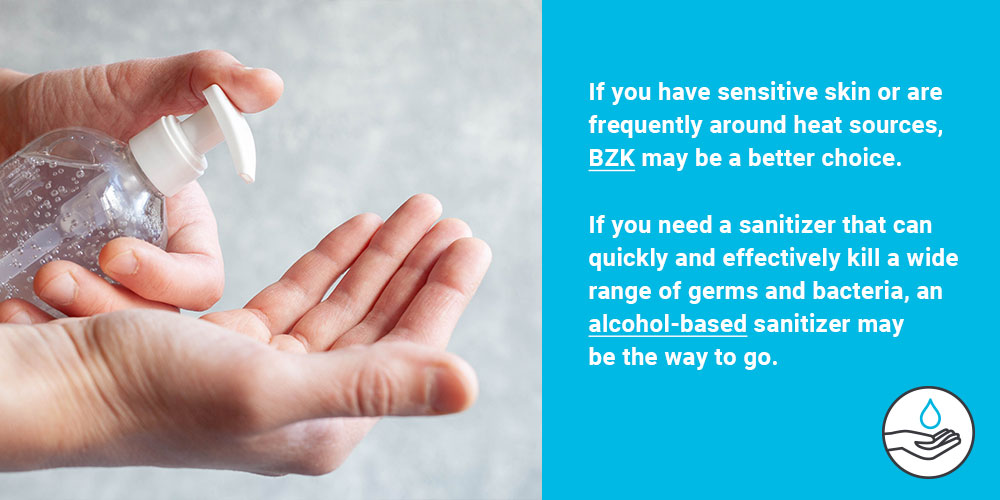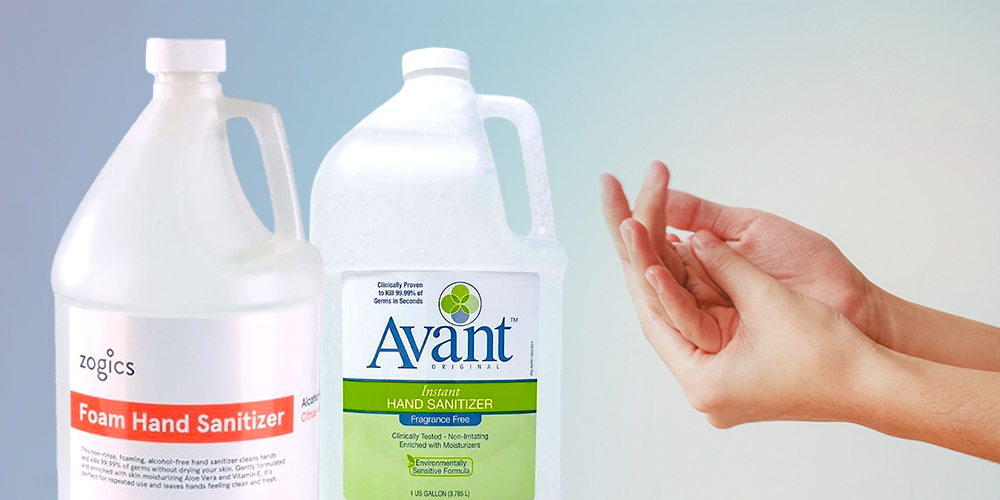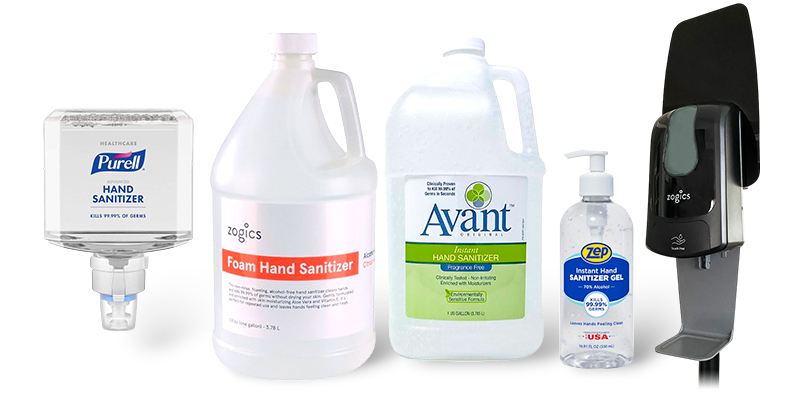When soap and water aren’t available, hand sanitizers become the next best defense against germs. But not all sanitizers work the same way. The key difference lies in their formulas — alcohol-based vs. non-alcohol hand sanitizers.
Understanding what sets them apart helps you choose the most effective option for your environment, whether you prioritize quick germ-killing action or gentler, skin-friendly ingredients like benzalkonium chloride.
In this guide, we’ll compare both types, exploring the benefits of alcohol-based hand sanitizers and alcohol-free alternatives to help you make the right choice for your facility.

Alcohol-Based Hand Sanitizer vs. Alcohol-Free Hand Sanitizer
Choosing between alcohol-based and alcohol-free hand sanitizers depends on your environment, skin sensitivity, and hygiene needs. Both are designed to kill germs effectively, but their active ingredients and performance differ in key ways.
Alcohol-Based Hand Sanitizers
These are the most common and widely recommended sanitizers. They typically contain 60–95% ethyl or isopropyl alcohol, which kills a broad range of pathogens, including bacteria, viruses, and fungi.
Benefits of Alcohol-Based Hand Sanitizers:
- Proven to kill most harmful germs quickly.
- Recommended by the CDC and WHO for effective hand hygiene.
- Ideal for healthcare, food service, and high-traffic public areas, especially when paired with the right commercial hand sanitizer solutions.
Considerations:
- Frequent use may dry or irritate sensitive skin.
- Flammable — should be stored safely away from heat sources.
- Not effective against some pathogens (e.g., norovirus, certain E. coli strains).
Alcohol-Free Hand Sanitizers
Alcohol-free sanitizers use alternative active ingredients, most commonly benzalkonium chloride, a quaternary ammonium compound that provides antimicrobial protection without the drying effects of alcohol.
3 Common Mistakes to Avoid When Using Alcohol Hand Sanitizer
- It can dry out the skin with frequent use, leading to chapped or cracked skin. This is because alcohol can strip the skin of its natural oils, leaving it dry and irritated.
- It’s flammable and can ignite under certain conditions. This is why it’s important to keep hand sanitizers away from heat sources and flames.
- It’s not effective against all types of pathogens, such as norovirus and some strains of E. coli. While alcohol-based sanitizers are effective against most pathogens, they may not be effective against all of them.
It’s also important to note that not all hand sanitizers are created equal. Some may contain less than the recommended amount of alcohol, making them less effective at killing germs.
Others may contain harmful ingredients, such as methanol, which can be toxic if ingested or absorbed through the skin. That’s why using reliable hand sanitizer dispensers stocked with high-quality formulas is essential. Always choose a hand sanitizer that contains at least 60% alcohol and check the ingredients list for any harmful additives.
Gel alcohol hand sanitizers are a convenient and effective way to clean your hands when soap and water are not available. However, it’s important to use them properly and to be aware of their limitations and potential risks.

Advantages of Alcohol-Free Hand Sanitizers
If you're looking for a non-flammable alternative, consider alcohol-free hand sanitizers. They are an effective way to kill germs and prevent the spread of diseases. Alcohol-free hand sanitizers work by using quaternary ammonium compounds (quats) to kill germs. Quats are effective at killing a wide range of pathogens, including bacteria, viruses, and fungi. They are also gentle on the skin and do not dry it out, making them ideal for persons with sensitive skin.
One of the key advantages of alcohol-free hand sanitizers is that they offer longer-lasting protection than alcohol-based sanitizers. This is because they continue to kill germs even after they dry. This means that you can go longer periods without having to reapply the sanitizer, which can be a time-saver.
In addition, alcohol-free hand sanitizers are non-flammable, making them safer to use in certain settings, such as hospitals and schools. They are also less likely to cause skin irritation and allergic reactions, which can be a concern with alcohol-based sanitizers.
How Alcohol-Free Hand Sanitizers Differ
Despite these advantages, there are also some things to consider when it comes to using alcohol-free sanitizers. For example, they may not be as effective in killing certain types of pathogens compared to alcohol-based sanitizers. This is because quats work by disrupting the cell membrane of the pathogen, which may not be effective against all types of germs.
Alcohol-free sanitizers also may take a longer time to dry. This is because they contain moisturizing agents that help to keep the skin hydrated. While this is a benefit for persons with dry skin, it can be a drawback for those who need to sanitize their hands quickly.
Alcohol-free hand sanitizers are a viable alternative to alcohol-based sanitizers. They offer longer-lasting protection, are gentler on the skin, and are safer to use in certain settings. However, they may not be as effective in killing certain types of pathogens and may take longer to dry. Ultimately, the choice between alcohol-based and alcohol-free hand sanitizers depends on your personal preferences and needs.
Benzalkonium Chloride vs Alcohol
Benzalkonium chloride is a type of quat that’s commonly used in alcohol-free hand sanitizers. It has long been used as a disinfectant, and research shows that it’s effective in killing various types of pathogens, including the coronavirus.
While it’s a viable alternative to alcohol, there are still some points to consider:
• It can cause allergies and irritation in some people, especially those with sensitive skin
• The concentration used in some products may not be enough to effectively kill germs
Overall, the benefits of benzalkonium chloride outweigh its concerns. It’s a good alternative for those who may find alcohol-based products too harsh on the skin.

What Hand Sanitizer is Right for You?
Ultimately, the choice between alcohol-based or alcohol-free hand sanitizers depends on your personal preferences and skin type.
In terms of cost-effectiveness, non-alcohol hand sanitizers are less expensive with more applications per gallon. A gallon of each may cost the same, but you will usually get 2,000 to 3,000 more applications out of the foaming hand sanitizers. This is because the dispensing mechanism adds air to the solution during the application, making the product go much further before running out.
Whether you choose an alcohol-based or alcohol-free sanitizer, make sure to use a reputable brand and apply it correctly for maximum effectiveness. By practicing good hand hygiene, we can all do our part to prevent the spread of germs and stay healthy.
At Zogics, we offer a variety of hand sanitizers to meet your needs. Explore our selection today and choose the option that works best for you and your community.
Alcohol-Based Vs. Alcohol-Free Hand Sanitizers: Frequently Asked Questions
Are alcohol-based hand sanitizers safer than alcohol-free alternatives?
Both are safe when used correctly. Alcohol-based hand sanitizers are more effective at killing a broad range of germs, while alcohol-free sanitizers are gentler on the skin and non-flammable. The right choice depends on your facility’s needs and skin sensitivity.
Is benzalkonium chloride better than alcohol?
Not necessarily. Benzalkonium chloride is less harsh and provides lasting antimicrobial protection, but alcohol kills more types of pathogens quickly. Alcohol is still the >CDC-recommended standard for healthcare and high-risk environments.
What is the best alcohol-based hand sanitizer?
The best sanitizers contain at least 60% ethyl or isopropyl alcohol, are fragrance-free or mild and meet FDA and CDC guidelines. Choose a trusted brand formulated for commercial or facility use to ensure consistency and effectiveness.
How does benzalkonium chloride kill bacteria?
Benzalkonium chloride (BZK) works by breaking down the bacterial cell membrane, causing the cell to lose its structure and die. It’s effective against many bacteria and some viruses, though it acts more slowly than alcohol.
What are the advantages of using alcohol-based gel?
Alcohol-based gels work fast, dry quickly, and don’t require water — making them ideal for on-the-go use. They kill most common germs and viruses within seconds, making them a top choice for hospitals, schools, and busy facilities.




